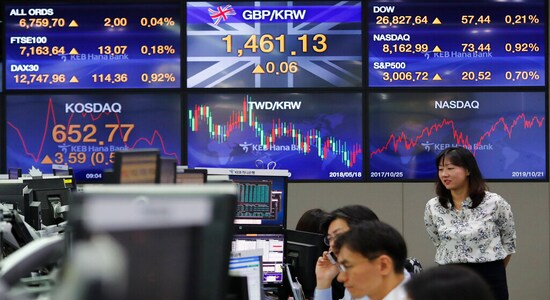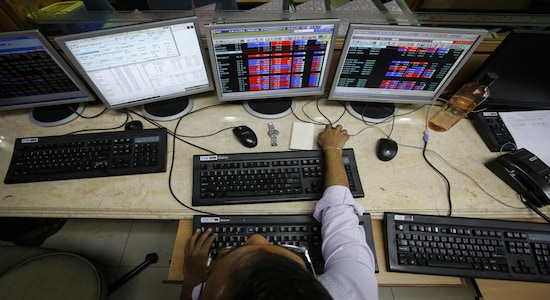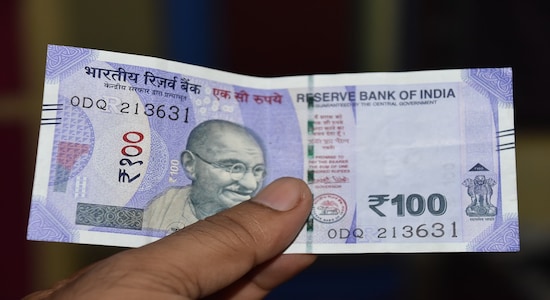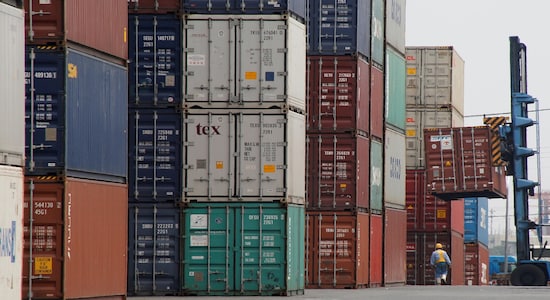
 1 / 10
1 / 101. Asia: Asia Pacific markets rose in early trade on Monday, despite the heightened U.S.-China tensions in recent weeks. South Korea’s Kospi index gained 0.43 percent as some of the big tech names advanced. In Australia, the benchmark ASX 200 was up 0.66 percent, with most sectors trading higher. Markets in Japan are closed Monday for a public holiday, reported CNBC International. (Image: AP)

 2 / 10
2 / 102. US: U.S. stock futures slipped on Sunday night after President Donald Trump signed several executive orders aimed at extending coronavirus relief. Dow Jones Industrial Average dipped 5 points, or less than 0.1 percent. S&P 500 and Nasdaq 100 futures were also marginally lower. Wall Street was coming off a strong weekly performance. Last week’s gains come during a historically tough time for the market as August kicks off the worst three-month stretch for the S&P 500, reported CNBC International. (Image: AP)

 3 / 10
3 / 103. Market At Close On Friday: The Indian benchmark equity indices, Sensex and Nifty ended Friday's volatile session little higher supported by gains in banks, metals, auto and FMCG stocks. The BSE’s 30-share Sensex ended 15.52 points or 0.04 percent higher at 38,040.57 while the Nifty gained 13.90 points or 0.12 percent to close at 11,214.05. Nifty Bank rose 111 points or 0.51 percent to end at 21,754. Broader indices outperformed the benchmarks as Nifty Smallcap and Nifty Midcap indices ended over 1 percent each.(Image: Reuters)

 4 / 10
4 / 104. Crude Oil: Oil prices fell more than 1 percent on Friday, limiting their weekly gain due to concerns the global recovery could falter from a resurgence of coronavirus cases. Brent crude fell 78 cents, or 1.7 percent, to $44.31 a barrel. West Texas Intermediate crude settled 67 cents, or 1.6 percent, lower at $41.28 per barrel. Brent is set for a weekly gain of 2.3 percent, while WTI is on track to rise 2.1 percent. (Image: Reuters)

 5 / 10
5 / 105. Rupee Close: The Indian currency ended almost flat at 74.93 (provisional) against the US dollar due to a caution prevailing in the forex market in view of mounting coronavirus cases and US-China trade tension. Starting off on a tepid note, the rupee fell to a low of 75.04, but recovered slightly thereafter and moved in a narrow band through the session. It finally settled at 74.93, gaining one paisa over its previous close. (Image: Reuters)

 6 / 10
6 / 106. Defence Ministry On Import Embargo: Defence minister Rajnath Singh on Sunday announced restrictions on the import of 101 weapons and military platforms including artillery guns, assault rifles and transport aircraft in what could give a major fillip to the domestic defence industry. "The Ministry of Defence is now ready for a big push to #AtmanirbharBharat initiative," Singh said on Twitter while making the announcement. He said the ministry has prepared a list of 101 items for which the embargo on imports is planned to be progressively implemented between 2020 and 2024. The list of 101 embargoed items comprises some high technology weapon systems like artillery guns, assault rifles, corvettes, sonar systems, transport aircraft, light combat helicopters (LCHs), radars and many other items. (Image: Reuters)

 7 / 10
7 / 107. Govt On Forming Panel For Exporters: The government has constituted a three-member committee for determination of ceiling rates under a scheme for reimbursement of taxes and duties to exporters. The reimbursement of taxes under the Remission of Duties and Taxes on Export Products (RoDTEP) such as duty on power charges, VAT on fuel in transportation, farm sector, captive power generation, mandi tax, stamp duty and central excise duty on fuel used in transportation would make Indian products competitive in global markets. It was decided that the sectors and products under the RoDTEP scheme would be notified in a phased manner and the MEIS (Merchandise Export from India Scheme) benefit for those sectors and items will be withdrawn. (Image: Reuters)

 8 / 10
8 / 108. DPIIT Supports Measures For Automotive, Capital Goods Steel: In a move to push 'Make in India' and become self-reliant or 'Aatmanirbhar’, the Department for Promotion of Industry and Internal Trade (DPIIT) has finalised some suggestions to boost the manufacturing of the flat steel products used in the capital goods and automobile industry. Flat steel category has been listed under 20 champion sectors identified by DPIIT to help the economy with high growth by generating employment and making the country a global hub for manufacturing. After an exhaustive discussion with all stakeholders and steel ministry, DPIIT has finalised short-term and long-term policy intervention to make India export hub for the world for capital goods and automotive steel requirements. (Image: Reuters)

 9 / 10
9 / 109. CRISIL On One-Time Loan Recast: One-time restructuring of corporate loans, which are facing stress due to coronavirus-induced disruptions, announced by the Reserve Bank of India (RBI) is likely to ease liquidity pressure for companies, according to a report. "The decision of RBI to enable lenders to permit a one-time restructuring of loans will ease the liquidity pressure on companies amid the COVID-19 pandemic," rating agency Crisil Ratings said in a report. Several corporates are likely to explore the opportunity to restructure their loans in order to conserve liquidity, especially given the continued weakness in demand amid economic recession, it said. (Stock Image)

 10 / 10
10 / 1010. US Adds 1.8 Million Jobs In July: The United States added 1.8 million jobs in July, a pullback from the gains of May and June and evidence that the resurgent coronavirus is stalling hiring and slowing an economic rebound. Even counting the hiring of the past three months, the economy has now recovered only about 42 percent of the 22 million jobs it lost to the pandemic-induced recession, according to the Labor Department's jobs report released Friday. The unemployment rate did decline in July from 11.1 percent to 10.2 percent , though that still exceeds the highest rate during the 2008-2009 Great Recession. (Image: AP)

